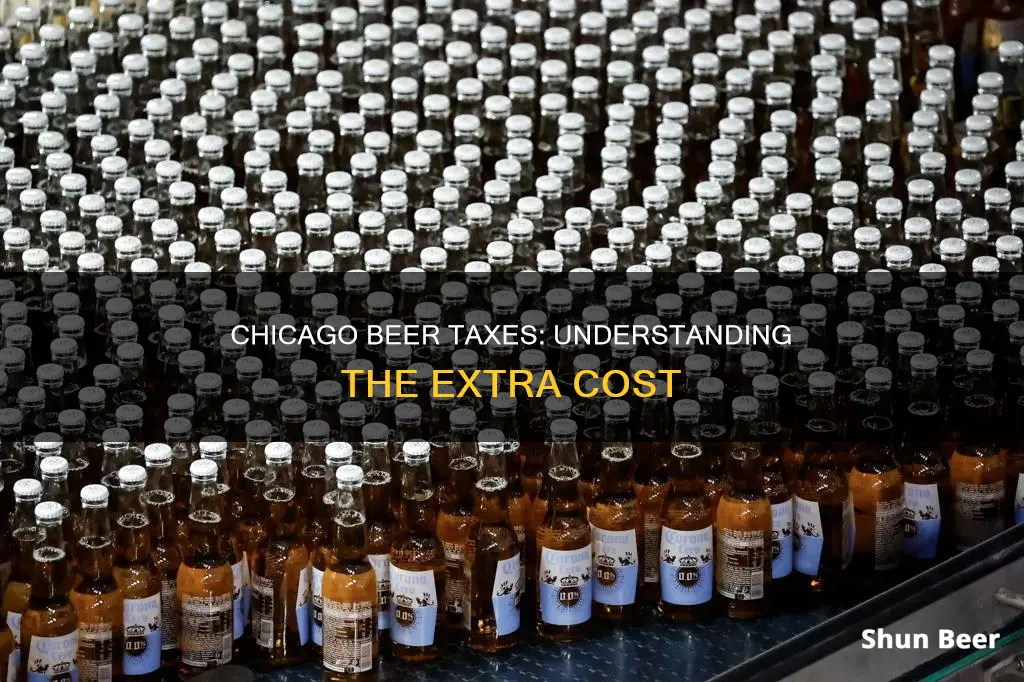
Chicago's alcohol tax is a contentious issue, with the city's alcohol tax burden being one of the highest in the country. The total effective tax rate on liquor in Chicago is 28%, with federal, state, county, and city taxes resulting in a significant tax burden on alcohol. The tax on beer in Chicago is particularly high, with an excise tax of $0.29 per gallon, compared to $0.02 per gallon in Wyoming and $1.15 per gallon in Tennessee. Chicago's Mayor Brandon Johnson has proposed raising taxes on beer, liquor, and wine sales, which has faced opposition from bar owners and aldermen. Chicago's alcohol tax has a long history, dating back to the first U.S. alcohol tax imposed to raise funds for the Revolutionary War, and it continues to be a topic of debate today.
What You'll Learn

Chicago's total tax on liquor is 28%
The state alcohol tax adds $1.69 to the price, while the federal tax adds $2.14. Additionally, city and county alcohol taxes contribute $1.03, and the city's 10.25% sales tax, the highest in any major US city, adds another $2.25. As a result, the consumer pays a total of $25.27 for the bottle of vodka, with a total tax burden of 28.16%.
Chicago's alcohol tax burden has increased over time, with the city and Cook County following the federal government's lead and raising alcohol taxes multiple times. While individual tax rates may seem insignificant, the combined impact results in a significant tax burden on alcohol. Chicago's alcohol tax is an example of the "sin tax," where certain products, such as alcohol, are taxed due to societal disapproval of their consumption.
The tax rates vary based on the type of alcohol and its alcohol by volume (ABV). For example, beer is taxed at $0.29 per gallon, while liquor with an ABV of 14% or less is taxed at $0.36 per gallon. Liquor with an ABV between 14% and 20% is taxed at $0.89 per gallon, and liquor with an ABV of 20% or higher is taxed at $2.68 per gallon. These taxes are imposed on businesses selling alcoholic beverages, which are responsible for collecting and remitting the taxes to the city.
The high tax burden on alcohol in Chicago has sparked opposition from bar owners and industry representatives, who argue that it hurts their businesses, especially when combined with the challenges posed by the pandemic. They claim that the thin margins in the industry make it difficult to absorb the tax, and passing it on to consumers could lead to decreased demand.
New Glarus Brewery: Beer Buying Experience
You may want to see also

Excise taxes are applied per gallon
When purchasing beer in Chicago, consumers are subject to various taxes, including excise taxes, which are applied per gallon. Excise taxes are a type of tax levied on specific goods or services, such as alcohol, and they are typically included in the price paid by the consumer. In the case of beer sold in Chicago, excise taxes are applied per gallon, and the tax rates can vary depending on several factors.
The City of Chicago imposes a liquor tax on businesses that sell alcoholic beverages, including beer. This tax is collected by the Chicago Department of Finance and is based on the volume of alcohol sold. For beer, the liquor tax in Chicago is $0.29 per gallon, as outlined in the Municipal Code. This rate is subject to change and has been adjusted over time.
In addition to the city tax, there are also state and federal excise taxes on beer sold in Illinois. The state excise tax on beer in Illinois is $0.23 per gallon, and this is in addition to the general sales tax of 6.25% that applies to beer purchases. The federal government also levies an excise tax on beer, which is $18 per barrel (31 gallons) or $0.57 per gallon. These taxes are collected from the merchants or brewers and are usually passed on to the consumer in the form of higher prices.
The combined effect of these excise taxes results in a significant tax burden on alcohol purchases in Chicago. For example, a standard 750-milliliter bottle of vodka may include a total of $7.11 in various taxes, with state, city, county, and federal taxes contributing to the overall tax amount. While each individual tax rate may seem modest, their cumulative impact can be substantial.
The excise taxes on beer in Chicago are part of a broader tax structure that includes various other taxes, such as sales taxes, and they contribute to the overall cost of alcohol purchases in the city. These taxes have been a source of debate, with proponents arguing for increased revenue for the city and opponents expressing concerns about the impact on businesses and consumers.
Buying Beer at Sheetz in Pennsylvania: What's the Deal?
You may want to see also

Chicago's proposed alcohol tax hike
Chicago's liquor tax applies to businesses that sell alcoholic beverages, which are required to collect the taxes and remit them to the city. The tax rate varies depending on the type of alcohol:
- $0.29 per gallon of beer
- $0.36 per gallon of liquor containing 14% or less alcohol by volume (ABV)
- $0.89 per gallon for liquor containing more than 14% and less than 20% ABV
- $2.68 per gallon containing 20% or more ABV
In November 2024, Chicago proposed an alcohol tax hike as part of Mayor Brandon Johnson's budget plan to address the city's nearly billion-dollar budget deficit. The proposal included a 34% to 36% increase in taxes on beer, liquor, and wine sales per gallon. This would translate to a 10-cent increase for beer, raising the tax from $0.29 to $0.39 per gallon, and a nearly $1 increase for spirits, raising the tax from $2.68 to $3.62 per gallon. Other alcoholic beverages would also see tax increases.
The proposed alcohol tax hike faced significant opposition from Chicago's hospitality industry, including bar and restaurant owners, industry associations, and local businesses. They argued that the tax increase would hurt their businesses, which were already struggling with rising costs and thin profit margins. There were concerns that the higher taxes would drive customers to purchase alcohol in the suburbs or other states with lower taxes, resulting in a loss of sales and revenue for Chicago businesses.
The City Council also unanimously rejected a proposed $300 million property tax hike, putting pressure on the mayor to find alternative sources of revenue. Mayor Johnson defended the alcohol tax proposal as a "`modest`" increase to keep up with inflation and argued that Chicago did not have the highest tax on alcohol compared to other cities in Illinois. However, the hospitality industry remained steadfast in its opposition, stating that even a small increase in the tax on alcohol would be detrimental to their businesses.
The proposed alcohol tax hike highlighted the challenges faced by the city in generating additional revenue while considering the potential impact on businesses and consumers. While the mayor's office projected an additional $10.6 million in revenue from the alcohol tax increase, there were concerns about the potential negative consequences for Chicago's hospitality industry and the overall economic activity in the city.
Buying Beer in Connecticut on Sundays: Is it Legal?
You may want to see also

Alcohol taxes in Illinois compared to other states
Chicago's total effective tax rate on liquor is 28%, which is made up of federal, state, county, and city taxes. The breakdown of these taxes is as follows: state alcohol taxes of $1.69, federal taxes of $2.14, city and county alcohol taxes of $1.03, and a 10.25% sales tax of $2.25.
In Illinois, excise taxes are applied to wine, beer, and liquor. The state's wine tax is $1.39 per gallon, with an additional $0.24 per gallon added by Cook County for wines up to 14% ABV, and an extra $0.36 per gallon for wine bought in Chicago. This brings the total combined state, county, and city taxes per gallon of wine to $1.99. Illinois' general sales tax of 6.25% also applies to wine purchases.
The state excise tax on beer in Illinois is $0.23 per gallon, with an additional $0.29 per gallon in Chicago and an extra $0.06 per gallon in Cook County. The state's liquor tax is $8.55 per gallon, with an additional $2.68 per gallon in Chicago and an extra $2.50 per gallon in Cook County for liquor under 20% ABV. For liquor over 20% ABV, the state tax is $1.39 per gallon.
When compared to other states, Illinois has relatively high taxes on alcohol. The state's wine tax is four times higher than in New York and Los Angeles. Illinois ranks 14th in the nation for its spirits tax rate, according to a 2014 study. The state's beer tax is the second-highest in the nation, after Tennessee, and its spirits tax is the 11th highest. Washington has the highest alcohol tax rate in the US at $33.22 per unit, followed by Oregon at $21.95 and Virginia at $19.89.
Utah's Full-Strength Beer Laws: Where to Buy?
You may want to see also

Chicago's liquor tax code
The liquor tax in Chicago applies to businesses selling alcoholic beverages, which are responsible for collecting and remitting the taxes to the City. The tax rates are specified per gallon of beverage and vary according to the type of alcohol and its alcohol content. For beer, the tax rate is $0.29 per gallon. For liquor, the tax rates are as follows:
- $0.36 per gallon for liquor containing 14% or less alcohol by volume
- $0.89 per gallon for liquor containing more than 14% and less than 20% alcohol by volume
- $2.68 per gallon for liquor containing 20% or more alcohol by volume
It's important to note that these rates are in addition to other taxes, such as state and federal alcohol taxes, which can further increase the cost of alcoholic beverages in Chicago.
Exemptions to the liquor tax in Chicago include purchases of alcoholic beverages by passengers on interstate carriers and purchases by churches or religious organizations for sacramental purposes.
Terrapin Beer: Available in Colorado?
You may want to see also
Frequently asked questions
The current beer tax in Chicago is $0.29 per gallon. This is in addition to the state excise tax of $0.23 per gallon, as well as federal excise taxes.
When you buy beer in Chicago, you pay the state sales tax of 6.25% as well as the beer tax of $0.29 per gallon. The total tax burden on alcohol in Chicago is high, at 28%.
The beer tax in Chicago is calculated on a per-unit basis, typically per gallon for liquids. The tax is collected from the merchant who sells the beer and is usually passed on to the consumer in the form of raised prices.







